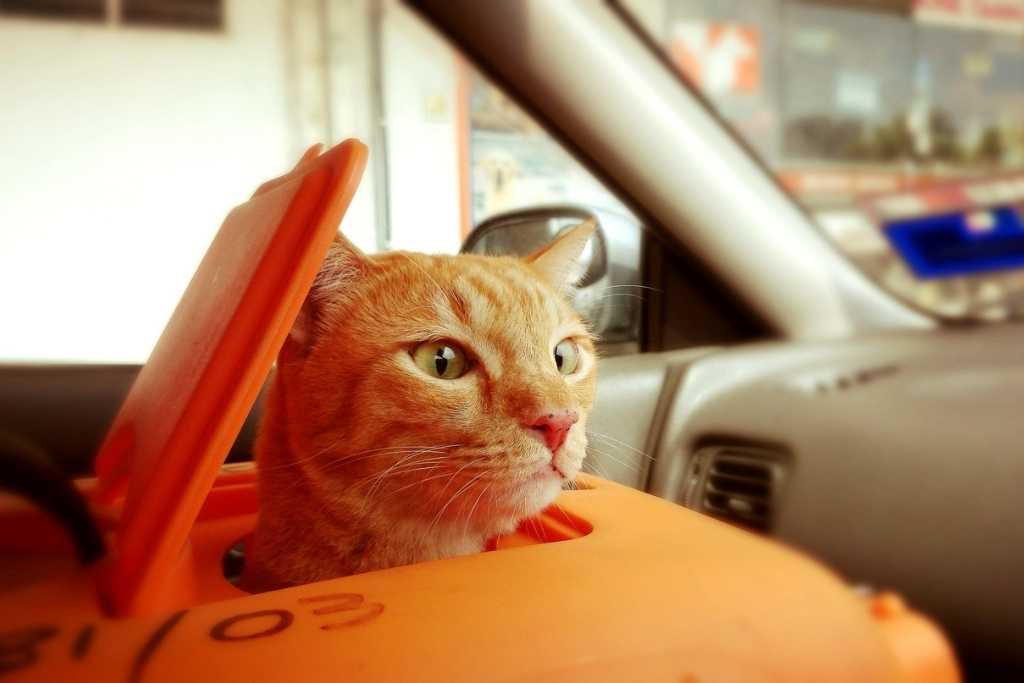AWAY FROM FREE SHIPPING
NICE. SHIPPING IS ON US!
AWAY FROM FREE GIFT
CHOOSE A FREE GIFT DURING CHECKOUT!
YOUR CART IS EMPTY. SHOP NOW.
Bringing your cat out, whether it’s to the vet or elsewhere, might sound stressful and a big headache for you and your feline friend - but it doesn’t have to be. In fact, it can absolutely be a breeze and is sure to open up your cat’s horizons.
Of course, the process of going out can be traumatic for some cats but follow the tips in this article to understand how to make travelling with your cat stress-free and extra fun!

In most households, cat carriers are almost always collecting dust in a room somewhere. The moment you get it out, your cat is on extra high alert - they know you only bring it out when you want to bring them to the cat vet! They’ll probably hide or run away, making it super difficult to get them into their carrier.
So what can you do?
Don’t leave it aside until you need it! If your cat is comfortable and happy in their cat carrier, you’ll be able to bring them out with absolutely no hassle at all. The key is to make the carrier a safe space, associated with positive experiences.
Finding the right carrier can solve all your problems - after all, some cats have strict preferences over the types of environments they feel comfortable in. For example, many cats prefer dark and cozy spaces, so a more covered carrier might be more appropriate.
For more insecure or easily frightened cats, purchasing a cat carrier like Stefanplast’s Gulliver 3 Cat Carrier that can be opened from the top might be useful! This allows a veterinarian to examine the cat even while they’re still in their carrier.

First, place your cat carrier in a room where your cat hangs out a lot. This could be a bedroom or in your living room - just make sure to place it where your cat has access to it. Leave the door open for your cat to jump in whenever they want.
You can also add an old shirt or some comfortable bedding inside the cat carrier to help your feline feel more secure in their new home away from home. Something that smells like their favourite person (that’s you!) can be comforting.
As with any cat training exercise, rewards are a great way to help your cat associate great things with their carrier. Try to feed them treats like SmartHeart’s Cat Lick Chicken Cat Treats when they use their cat crate, or use catnip to encourage your cat to sit inside their cat carrier.
However, it’s important not to try and outwardly lure your cat into their carrier! Your cat might get suspicious and too cautious around their cat crate. Instead, be patient and take your time with this process. You may even need to use a feline pheromone spray or wipe to help make the carrier more interesting to your feline friend.
Before you attempt to get your cat into their carrier for an outing, make sure to catch them when they’re calm.

In the few hours before you want to leave, try and keep your cat in a quiet and calm environment. Avoid quick movements around her and definitely do not loom over your cat.
Alternatively, you can also encourage your cat to play and chase their favourite toys – check out our selection of Kong Catnip toys that are sure to encourage your cat to play all day!
Okay - by now, your cat should be a lot more comfortable with their cat crate. But that doesn’t mean they’ll willingly get in if they don’t feel like it!

Once your cat is in their cat crate, cover the top with a towel or cloth to make the inside of the barrier dark. The visual barrier will also help your cat feel safer. Again, when you’re transporting your feline, avoid jerking the cat crate around. In fact, as far as possible help keep a steady motion to avoid frightening them!

Success! Your cat should be safely in their cat carrier and ready to go out. But you still have to be wary about your cat’s mood once you’ve left your home. Some cats may be afraid of the noises in a car - so keeping them calm in your car is also another challenge.
As mentioned, cat calming pheromone sprays/wipes, toys and treats can help distract your cat and keep them calm. It’s also important to keep your cat at a comfortable temperature and drive smoothly. Attach your cat’s carrier to a seatbelt to help keep them extra safe and secure. Playing soft and cat calming music can also help your cat feel calm.
If you have a passenger in your car with you, get them to pet your cat reassuringly and talk with them gently.

With any luck, by now your cat should be much happier and calmer when they’re outside in their carriers. The world is your oyster! Of course, avoid keeping your cat in their carrier for too long, but other than that, leaving the home with your feline in tow will be a much more enjoyable experience.
The same techniques can also be applied to teaching your cat how to use a cat harness. This particular tool will help you keep adventurous cats happy with trips outdoors!
Trips with your cat can be stressful - but if you’re well prepared and you’ve practiced how to handle your cat well, it’ll be a piece of cake!

Comments will be approved before showing up.



